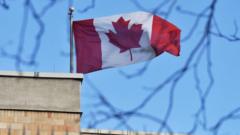Canadian officials confirm that four dual citizens were executed in China on drug charges, igniting outrage and raising questions about diplomatic relations. Despite repeated calls for mercy from Canada, China defends its legal processes, asserting evidence against the individuals was solid. This incident underscores ongoing tensions between the two nations.
Canada Condemns Executions of Four Citizens in China Amid Growing Diplomatic Strain

Canada Condemns Executions of Four Citizens in China Amid Growing Diplomatic Strain
The execution of four Canadians for drug-related offenses in China has heightened tensions between Ottawa and Beijing, prompting calls for clemency and deeper discussions on human rights.
China has executed four Canadians this year for drug offenses, confirming their identities as dual citizens. Canadian Foreign Minister Mélanie Joly announced this, stating that their identities would remain confidential. The execution has drawn sharp condemnation from the Canadian government, which has been advocating for clemency and opposing the death penalty globally.
In response, the Chinese embassy in Canada criticized Ottawa's remarks as "irresponsible", emphasizing that the actions were taken "in accordance with the law" and that ample evidence had been presented for the convictions. China does not recognize dual citizenship, and the executions highlight their uncompromising stance on drug-related crimes, a rarity for foreign nationals.
Joly expressed her profound concern over the cases, revealing that she had been in close contact with other officials, including former Prime Minister Justin Trudeau, in an effort to prevent the executions. Global Affairs Canada reiterated its commitment to opposing the death penalty "in all cases, everywhere," reflecting growing fears over human rights in China.
Amnesty International Canada condemned the executions as "shocking and inhumane," urging that it should serve as a wake-up call for Canadian authorities. They also extended condolences to the families affected and acknowledged the plight of other Canadians who may be facing the death penalty in China.
The relationship between Canada and China has been tense since 2018, following the detention of a Chinese executive on a US extradition request. This led to the arrest of two Canadians, who have since been released. Tensions escalated further in 2023 when Canadian media alleged Chinese interference in federal elections, which Beijing vehemently denied.
Recent trade disputes have added to the diplomatic strain, with China retaliating by imposing tariffs on Canadian agricultural imports in response to Canadian tariffs on Chinese products. These developments point to a complex and deteriorating diplomatic landscape between the two nations, with human rights concerns at the forefront of ongoing discussions.





















